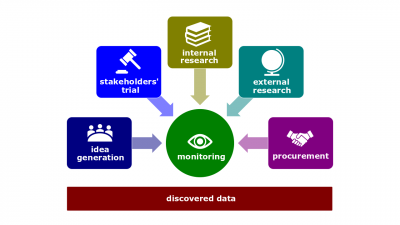Difference between revisions of "Enterprise discovery"
(→Related coursework) |
|||
| Line 1: | Line 1: | ||
| − | [[File:Discovery.png|400px|thumb|right|[[Enterprise discovery]]]][[Enterprise discovery]] (hereinafter, the ''Discovery'') is the first batch of [[ | + | [[File:Discovery.png|400px|thumb|right|[[Enterprise discovery]]]][[Enterprise discovery]] (hereinafter, the ''Discovery'') is the first batch of [[DAMP]]; the ''Discovery'' includes all activities resulted in obtaining or discovery of any data relevant to further effort development. These data include some statement of the [[business need]] that is sought to be satisfied as the key outcome from that effort as a whole. The ''Discovery'' "contributes" the first letter '''D''' to the [[DAMP]] abbreviation; the further development includes [[Enterprise analysis|'''A'''nalysis]], [[Enterprise modeling|'''M'''odeling]], and [[Enterprise planning|'''P'''lanning]]. |
Revision as of 14:08, 21 April 2019
Enterprise discovery (hereinafter, the Discovery) is the first batch of DAMP; the Discovery includes all activities resulted in obtaining or discovery of any data relevant to further effort development. These data include some statement of the business need that is sought to be satisfied as the key outcome from that effort as a whole. The Discovery "contributes" the first letter D to the DAMP abbreviation; the further development includes Analysis, Modeling, and Planning.
Definitions
According to Bracka School,
Enterprise discovery. All activities resulted in obtaining of any data relevant to further effort development undertaken in order to achieve the effort goals.
Techniques
- Interviews
- Focus Groups
- Facilitated Workshops, including:
- Group Creativity Techniques
- Brainstorming
- Nominal group technique
- Idea/mind mapping
- Affinity diagram
- Multicriteria decision analysis
- Group Decision-Making Techniques, including:
- Unanimity (including the Delphi Technique)
- Majority
- Plurality
- Dictatorship
- Questionnaires and Surveys
- Observations
- Prototypes
- Benchmarking
- Context Diagrams
- Document Analysis
